Shows
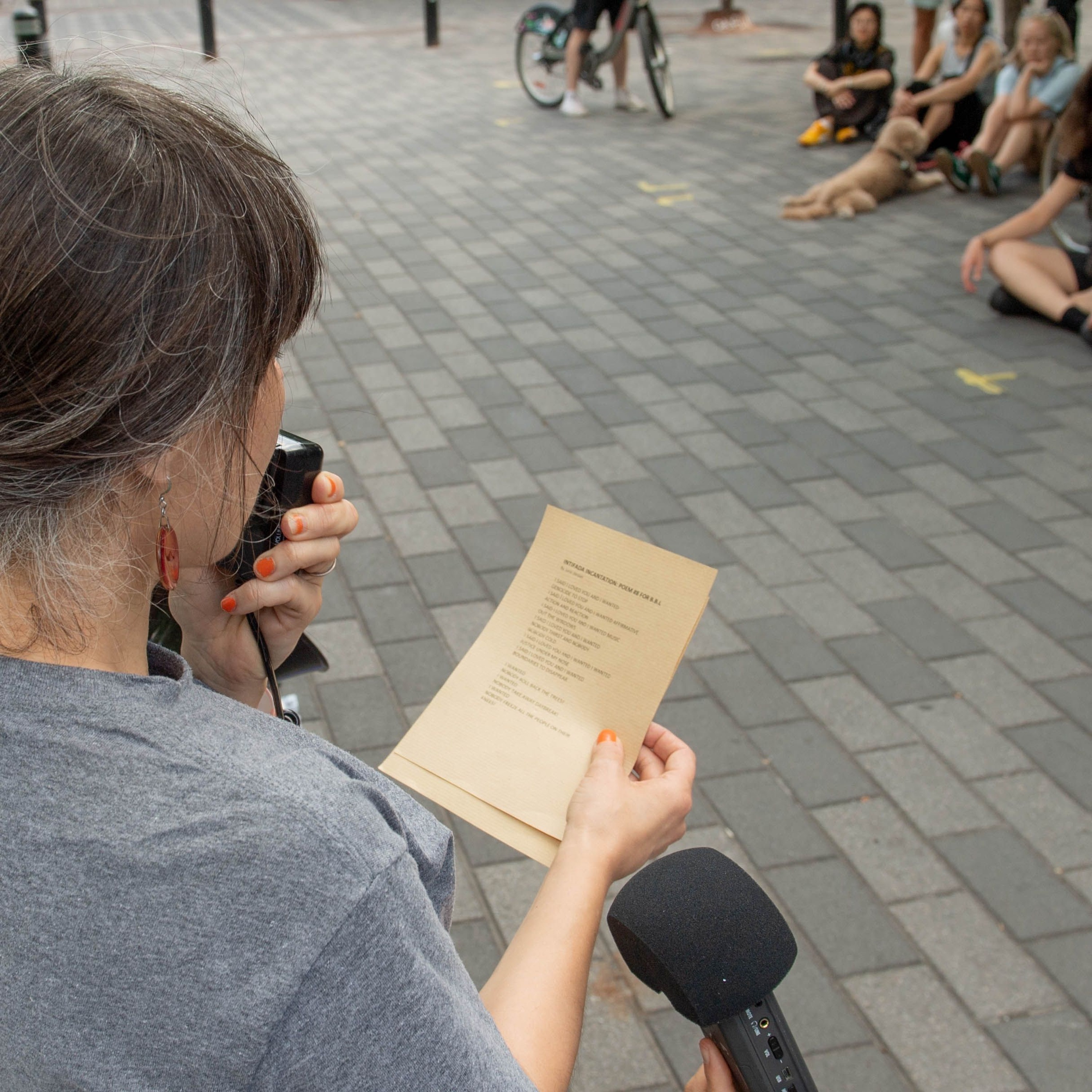 Free City RadioNo Silence : mix راديو الحارةA 30 minute mix featuring the voices of poets, community activists and folks in Montreal who joined a Palestine solidarity action outside of métro Laurier in July 2025. The photo was taken of poet Deanna Radford reading at the action by Abdelali Essaouis.
In this 30 minute piece you hear from folks in this order:
Marie, who participants in Bikers for Palestine, Montreal
Aymen Benbouzid, who also participants in Bikers for Palestine, Montreal
Nizar, a Palestinian in the diaspora of Montreal reading Mahmoud Darwish.
Rachel Cheng, a writer and food justice advocate reading George Abraham.
Myriam Cloutier, a housing justice organizer with P...2025-07-1730 min
Free City RadioNo Silence : mix راديو الحارةA 30 minute mix featuring the voices of poets, community activists and folks in Montreal who joined a Palestine solidarity action outside of métro Laurier in July 2025. The photo was taken of poet Deanna Radford reading at the action by Abdelali Essaouis.
In this 30 minute piece you hear from folks in this order:
Marie, who participants in Bikers for Palestine, Montreal
Aymen Benbouzid, who also participants in Bikers for Palestine, Montreal
Nizar, a Palestinian in the diaspora of Montreal reading Mahmoud Darwish.
Rachel Cheng, a writer and food justice advocate reading George Abraham.
Myriam Cloutier, a housing justice organizer with P...2025-07-1730 min The Hive Poetry CollectiveS5: E39 Poets of Palestinian Heritage, hosted by Julia Chiapella & Farnaz FatemiFarnaz Fatemi and Julia Chiapella read poems by Palestinian poets and those of Palestinian heritage to amplify and bear witness to the range of their perspectives and the richness of these voices. We found the reading of these aloud to each other to be profoundly moving. Please see the extensive show notes for links to the poets, their books, many more we couldn’t include on the show and other recent resources.
In this order--Fadwa Tuqan, Lena Khalaf Tuffaha, Zeina Azzam, Mahmoud Darwish, Mosab Abu Toha, Maya Abu Al-Hayyat, Noor Hindi, Naomi Shihab Nye were featured o...2023-12-1257 min
The Hive Poetry CollectiveS5: E39 Poets of Palestinian Heritage, hosted by Julia Chiapella & Farnaz FatemiFarnaz Fatemi and Julia Chiapella read poems by Palestinian poets and those of Palestinian heritage to amplify and bear witness to the range of their perspectives and the richness of these voices. We found the reading of these aloud to each other to be profoundly moving. Please see the extensive show notes for links to the poets, their books, many more we couldn’t include on the show and other recent resources.
In this order--Fadwa Tuqan, Lena Khalaf Tuffaha, Zeina Azzam, Mahmoud Darwish, Mosab Abu Toha, Maya Abu Al-Hayyat, Noor Hindi, Naomi Shihab Nye were featured o...2023-12-1257 min Plumilla decidió volar1x14 - Gaza, los Franco y bibliotecasEn el episodio de hoy os doy algunas herramientas, en clave literaria, para comprender el conflicto palestino-israelí y, sobre todo, cómo es también su literatura. Joe Sacco, uno de los reporteros de guerra que mejor lo ha ilustrado, Edward Said, gran académico, Ilan Pappé, un historiador israelí, Abraham B. Yehoshúa, con "La novia prometida" y poetas como Rafeef Ziadah y Mahmoud Darwish, con cuyo poema "Para nuestra patria" acabamos.
En las noticias, felicitamos a la escritora Gloria Steinem por su Premio Princesa de Asturias y hablamos de la polémica donación de la fam...2021-05-3020 min
Plumilla decidió volar1x14 - Gaza, los Franco y bibliotecasEn el episodio de hoy os doy algunas herramientas, en clave literaria, para comprender el conflicto palestino-israelí y, sobre todo, cómo es también su literatura. Joe Sacco, uno de los reporteros de guerra que mejor lo ha ilustrado, Edward Said, gran académico, Ilan Pappé, un historiador israelí, Abraham B. Yehoshúa, con "La novia prometida" y poetas como Rafeef Ziadah y Mahmoud Darwish, con cuyo poema "Para nuestra patria" acabamos.
En las noticias, felicitamos a la escritora Gloria Steinem por su Premio Princesa de Asturias y hablamos de la polémica donación de la fam...2021-05-3020 min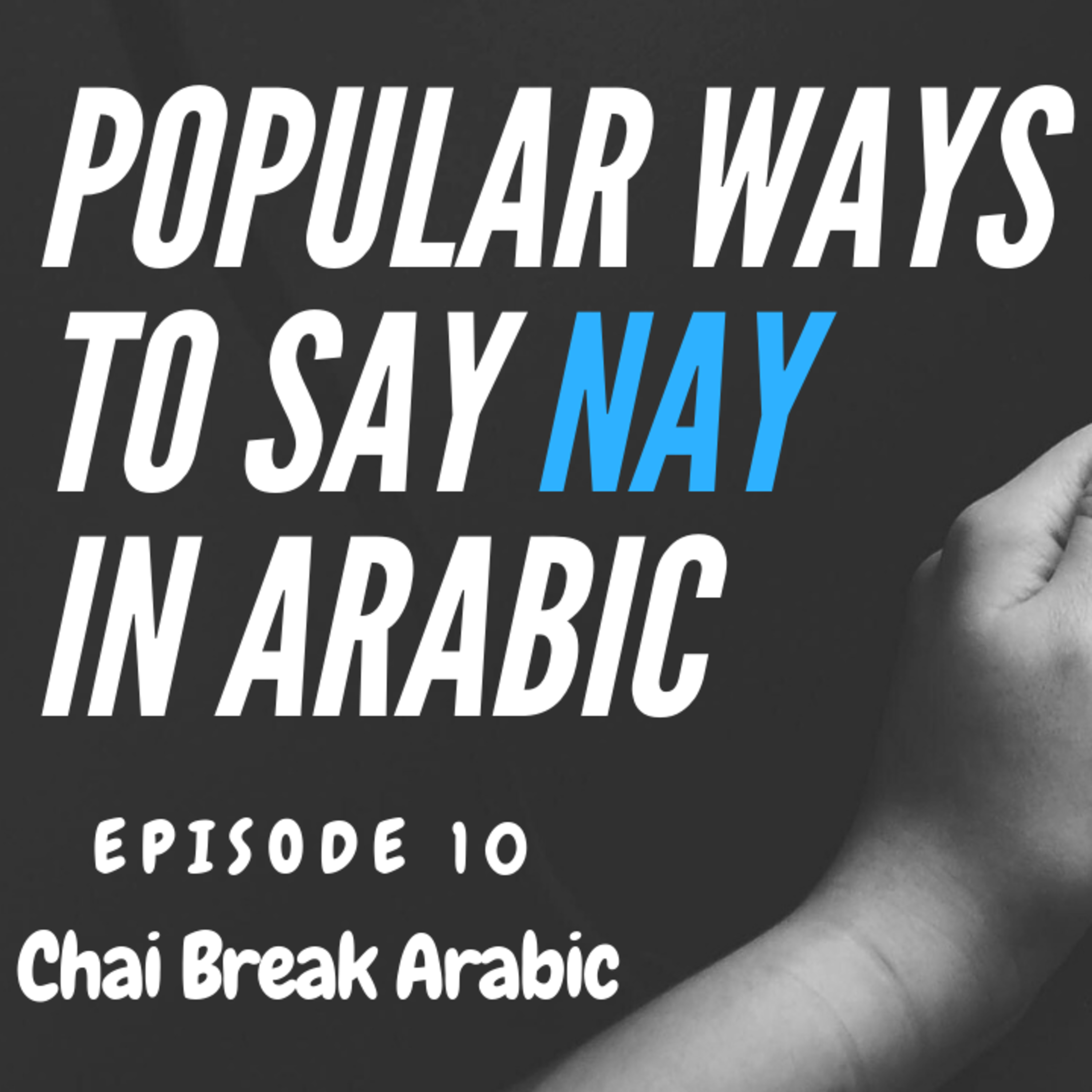 Chai Break ArabicPopular Ways to Say Nay in Arabic - Episode 10In episode 10 of Chai Break #Arabic we learn popular ways to say Nay in Arabic:
1. لا [La] - No,
2. إلا [il-la] - Except,
3. كلا [kal-la] - Certainly not,
4. لن [la-n] - Not (future),
5. لم [la-m] - Not (past),
6. ما [ma] - Not
7. ليس \ ليست [Lay-sat / Lay-sa] - Not (female / male)
If you have any questions concerns please follow me/message me on Twitter @abetheexplorer
Become a supporter of this podcast: anchor.fm/chai-break-arabic/support
---
Support this podcast: https://anchor.fm/chai-break-arabic/support2018-10-0210 min
Chai Break ArabicPopular Ways to Say Nay in Arabic - Episode 10In episode 10 of Chai Break #Arabic we learn popular ways to say Nay in Arabic:
1. لا [La] - No,
2. إلا [il-la] - Except,
3. كلا [kal-la] - Certainly not,
4. لن [la-n] - Not (future),
5. لم [la-m] - Not (past),
6. ما [ma] - Not
7. ليس \ ليست [Lay-sat / Lay-sa] - Not (female / male)
If you have any questions concerns please follow me/message me on Twitter @abetheexplorer
Become a supporter of this podcast: anchor.fm/chai-break-arabic/support
---
Support this podcast: https://anchor.fm/chai-break-arabic/support2018-10-0210 min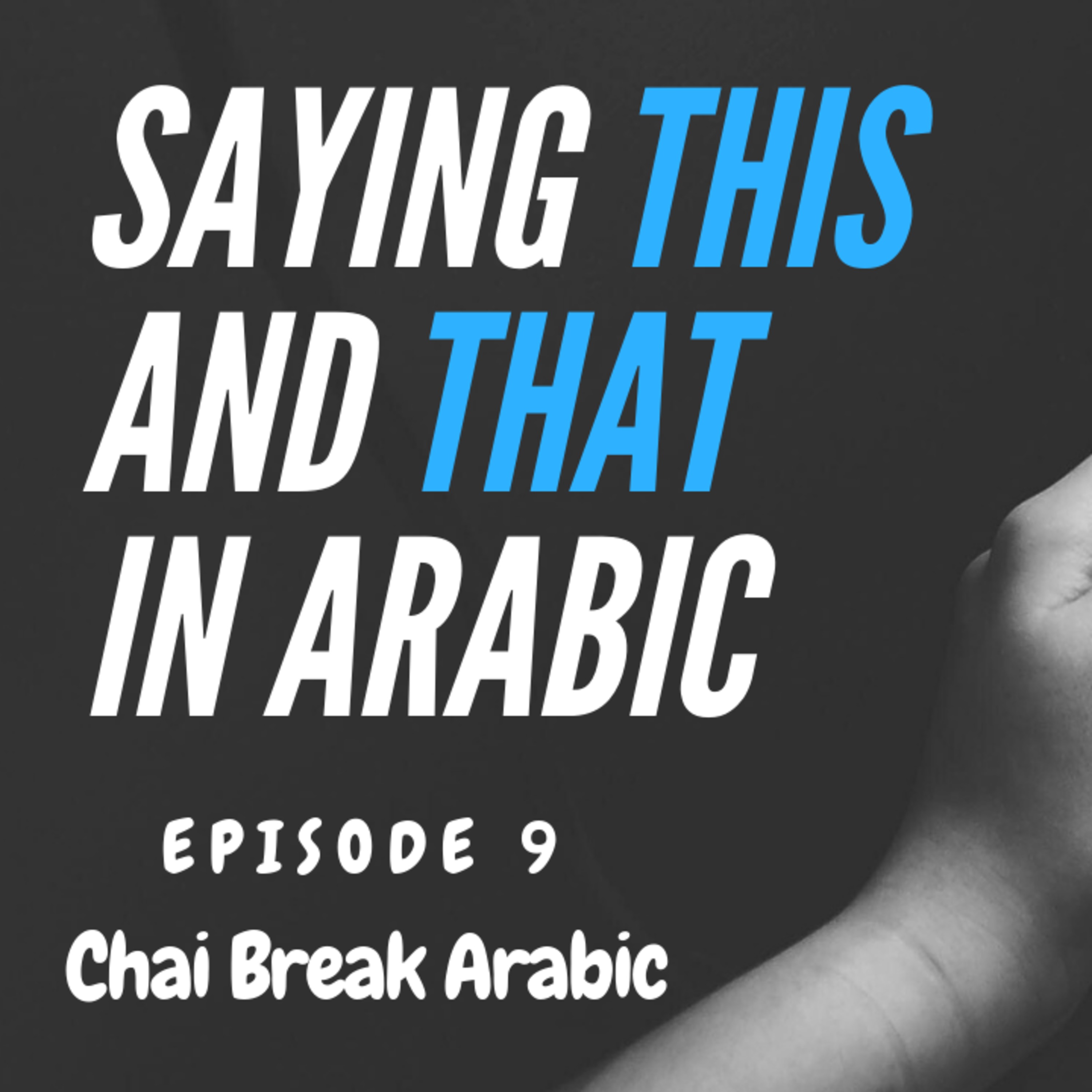 Chai Break ArabicSaying This and That in Arabic - Episode 9In episode 9 of Chai Break #Arabic we learn how to this and that in Arabic:
1. هذا [Ha-th-a] - This (male),
2. هذه [Ha-thi-Hee] - This (female),
3. ذلك [tha-lik-a] - That (male),
4. تلك [til-ka] - That (female),
5. هؤلاء [Ha-oo-la'] - These (plural male or female)
6. أولئك [oo-la'-ika] - Those (plural male or female)
If you have any questions concerns please follow me/message me on Twitter @abetheexplorer
Become a supporter of this podcast: anchor.fm/chai-break-arabic/support
---
Support this podcast: https://anchor.fm/chai-break-arabic/support2018-09-2809 min
Chai Break ArabicSaying This and That in Arabic - Episode 9In episode 9 of Chai Break #Arabic we learn how to this and that in Arabic:
1. هذا [Ha-th-a] - This (male),
2. هذه [Ha-thi-Hee] - This (female),
3. ذلك [tha-lik-a] - That (male),
4. تلك [til-ka] - That (female),
5. هؤلاء [Ha-oo-la'] - These (plural male or female)
6. أولئك [oo-la'-ika] - Those (plural male or female)
If you have any questions concerns please follow me/message me on Twitter @abetheexplorer
Become a supporter of this podcast: anchor.fm/chai-break-arabic/support
---
Support this podcast: https://anchor.fm/chai-break-arabic/support2018-09-2809 min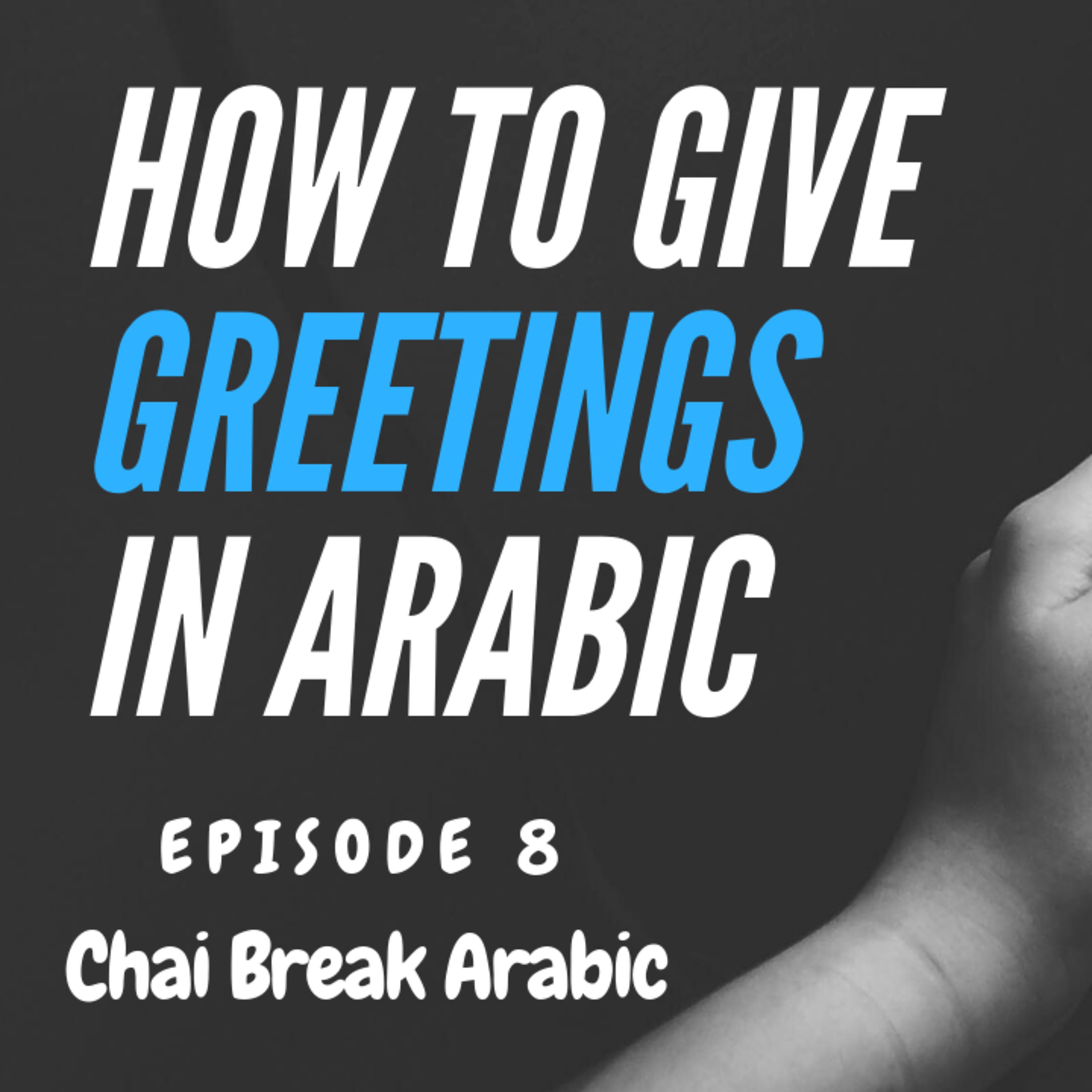 Chai Break ArabicHow to give Greetings in Arabic - Episode 8In episode 8 of Chai Break #Arabic we discuss how to give greetings in Arabic:
1. صباح الخير [sa-ba-h al-kh-ayr] - Good Morning,
2. مساء الخير [ma-sa' al-kh-ayr] - Good Evening,
3. يجب أن اذهب [ya-jab An ath-hab] - I must go,
4. على أن اذهب [ala-ya An ath-hab] - It is upon me to go,
If you have any questions concerns please follow me/message me on Twitter @abetheexplorer
Become a supporter of this podcast: anchor.fm/chai-break-arabic/support
---
Support this podcast: https://anchor.fm/chai-break-arabic/support2018-09-2605 min
Chai Break ArabicHow to give Greetings in Arabic - Episode 8In episode 8 of Chai Break #Arabic we discuss how to give greetings in Arabic:
1. صباح الخير [sa-ba-h al-kh-ayr] - Good Morning,
2. مساء الخير [ma-sa' al-kh-ayr] - Good Evening,
3. يجب أن اذهب [ya-jab An ath-hab] - I must go,
4. على أن اذهب [ala-ya An ath-hab] - It is upon me to go,
If you have any questions concerns please follow me/message me on Twitter @abetheexplorer
Become a supporter of this podcast: anchor.fm/chai-break-arabic/support
---
Support this podcast: https://anchor.fm/chai-break-arabic/support2018-09-2605 min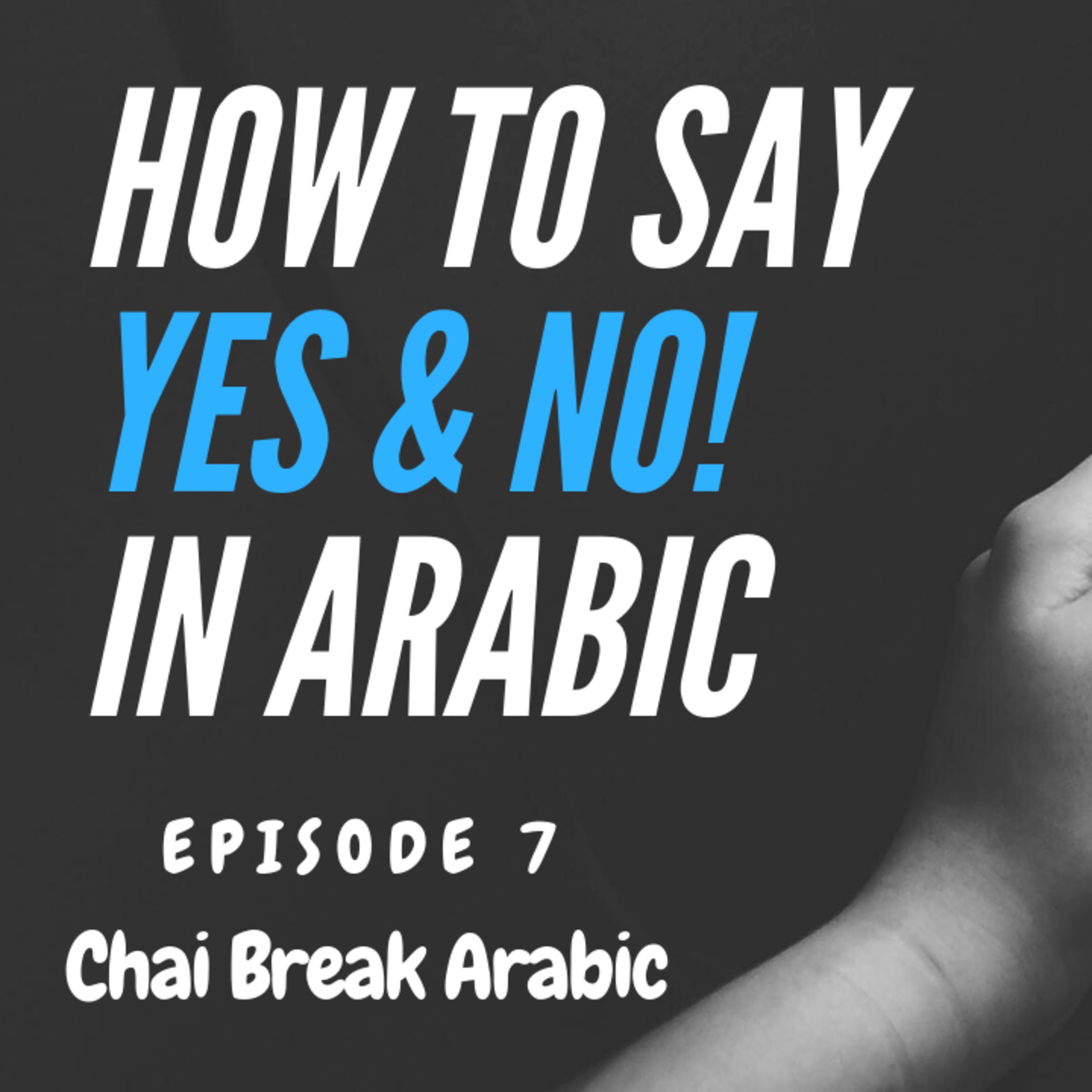 Chai Break ArabicHow to say Yes & No! in Arabic - Episode 7In episode 7 of Chai Break #Arabic we discuss how to say Yes & No! in Arabic:
1. نعم [na'm] - Yes,
2. أيواه [aywa] - slang for Yes,
3. لا [la] - No,
4. لأ [la'] - slang for No,
If you have any questions concerns please follow me/message me on Twitter @abetheexplorer
Become a supporter of this podcast: anchor.fm/chai-break-arabic/support
---
Support this podcast: https://anchor.fm/chai-break-arabic/support2018-09-2405 min
Chai Break ArabicHow to say Yes & No! in Arabic - Episode 7In episode 7 of Chai Break #Arabic we discuss how to say Yes & No! in Arabic:
1. نعم [na'm] - Yes,
2. أيواه [aywa] - slang for Yes,
3. لا [la] - No,
4. لأ [la'] - slang for No,
If you have any questions concerns please follow me/message me on Twitter @abetheexplorer
Become a supporter of this podcast: anchor.fm/chai-break-arabic/support
---
Support this podcast: https://anchor.fm/chai-break-arabic/support2018-09-2405 min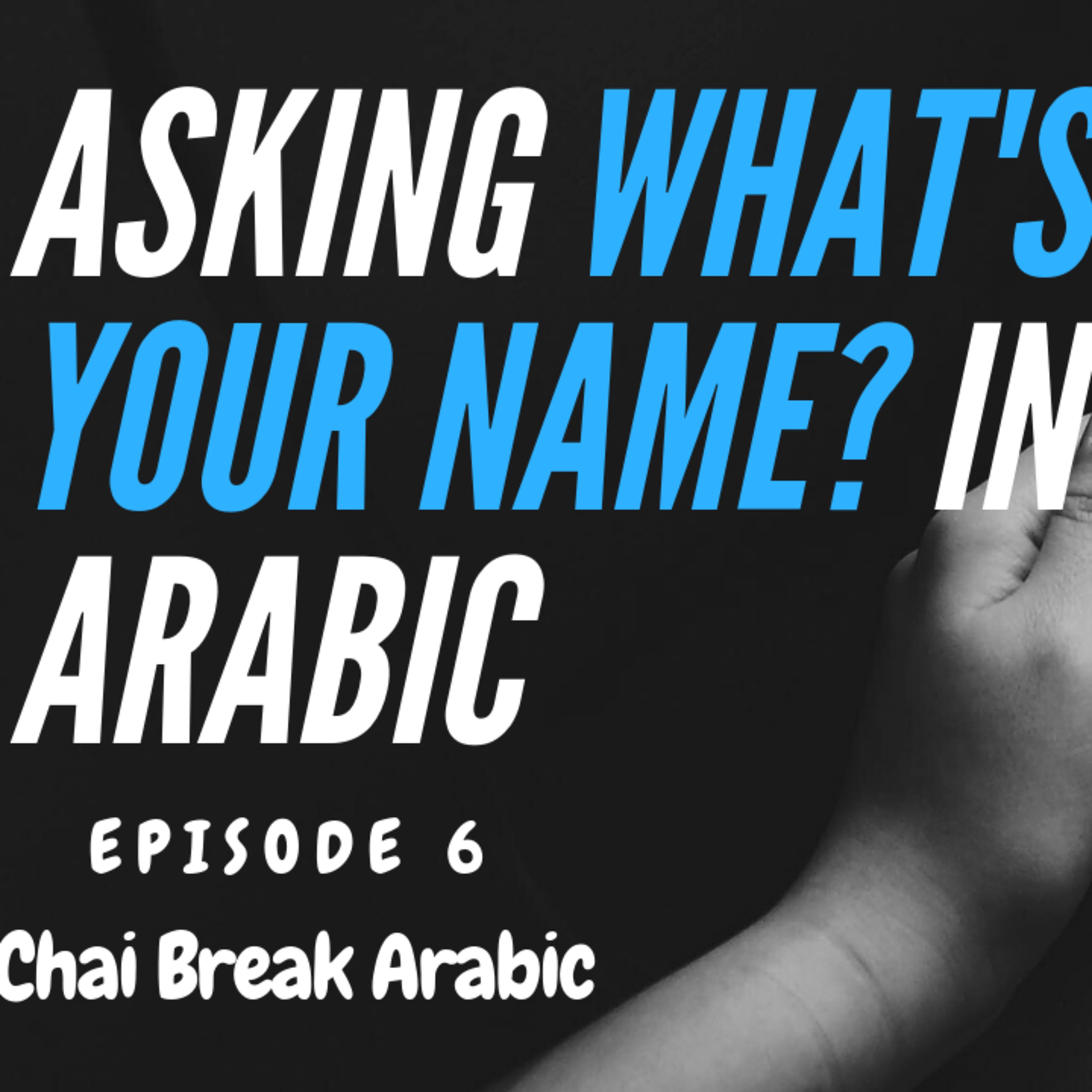 Chai Break ArabicAsking What's Your Name? In Arabic - Episode 6 - Chai Break ArabicIn episode 6 of Chai Break #Arabic we discuss how to ask "What's Your Name?" and how to respond in Arabic:
1. ما إسمك؟ [ma is-mu-ka (to male) / ma is-mu-ki (to female)] - What's your name?,
2. أنا إسمي [ana is-mi] - My name is ...,
3. إسمي [is-mi] - name is ...,
If you have any questions concerns please follow me/message me on Twitter @abetheexplorer
Become a supporter of this podcast: anchor.fm/chai-break-arabic/support
---
Support this podcast: https://anchor.fm/chai-break-arabic/support2018-09-2106 min
Chai Break ArabicAsking What's Your Name? In Arabic - Episode 6 - Chai Break ArabicIn episode 6 of Chai Break #Arabic we discuss how to ask "What's Your Name?" and how to respond in Arabic:
1. ما إسمك؟ [ma is-mu-ka (to male) / ma is-mu-ki (to female)] - What's your name?,
2. أنا إسمي [ana is-mi] - My name is ...,
3. إسمي [is-mi] - name is ...,
If you have any questions concerns please follow me/message me on Twitter @abetheexplorer
Become a supporter of this podcast: anchor.fm/chai-break-arabic/support
---
Support this podcast: https://anchor.fm/chai-break-arabic/support2018-09-2106 min Chai Break ArabicReply to How Are You? In Arabic - Episode 5 - Chai Break ArabicIn episode 5 of Chai Break Arabic we discuss four ways to respond to the question "How Are You?" in Arabic:
1. الحمد الله [al-hamdu lil-ah] which means "Thank God",
2. أنا بخير [ana bi-khayr] which means "I am well",
3. جيد [jay-id] which means "good",
4. أنا لست بخير [ana lest-to bi-khayr] which means "I am not well"
If you have any questions concerns please follow me/message me on Twitter @abetheexplorer
Become a supporter of this podcast: anchor.fm/chai-break-arabic/support
---
Support this podcast: https://anchor.fm/chai-break-arabic/support2018-09-1909 min
Chai Break ArabicReply to How Are You? In Arabic - Episode 5 - Chai Break ArabicIn episode 5 of Chai Break Arabic we discuss four ways to respond to the question "How Are You?" in Arabic:
1. الحمد الله [al-hamdu lil-ah] which means "Thank God",
2. أنا بخير [ana bi-khayr] which means "I am well",
3. جيد [jay-id] which means "good",
4. أنا لست بخير [ana lest-to bi-khayr] which means "I am not well"
If you have any questions concerns please follow me/message me on Twitter @abetheexplorer
Become a supporter of this podcast: anchor.fm/chai-break-arabic/support
---
Support this podcast: https://anchor.fm/chai-break-arabic/support2018-09-1909 min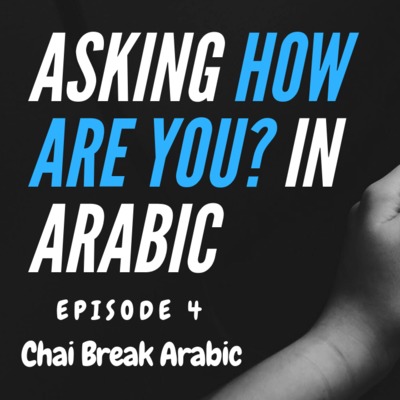 Chai Break ArabicAsking How Are You In Arabic - Episode 4 - Chai Break ArabicIn episode 4 of Chai Break Arabic we discuss how to ask the question "how are you" and the simplest response to the question. To ask the question you simply say كيف حالك [kay-fa hA-lak (to male) / kay-fa hA-lik (to female)]. We also learn about one way to respond to this question in conversation; by saying "I am well" or أنا بخير [ana bi-kh-ayr]. If you have any questions concerns please follow me/message me on Twitter @abetheexplorer Become a supporter of this podcast: anchor.fm/chai-break-arabic/support
---
Support this podcast: https://anchor.fm/chai-break-arabic/support2018-09-1706 min
Chai Break ArabicAsking How Are You In Arabic - Episode 4 - Chai Break ArabicIn episode 4 of Chai Break Arabic we discuss how to ask the question "how are you" and the simplest response to the question. To ask the question you simply say كيف حالك [kay-fa hA-lak (to male) / kay-fa hA-lik (to female)]. We also learn about one way to respond to this question in conversation; by saying "I am well" or أنا بخير [ana bi-kh-ayr]. If you have any questions concerns please follow me/message me on Twitter @abetheexplorer Become a supporter of this podcast: anchor.fm/chai-break-arabic/support
---
Support this podcast: https://anchor.fm/chai-break-arabic/support2018-09-1706 min Chai Break ArabicGiving Thanks in Arabic - Episode 3 - Chai Break ArabicIn episode 3 of Chai Break Arabic we discuss four ways to give thanks and say thank you in Arabic: شكرًا [shuk-ran], شكرًا لك [shuk-ran lak (to male) / shuk-ran laki (to femaile)], شكرًا جزيلا [shuk-ran jaz-eel-an], جزاكم الله خيرا [jaz-ak-um Allahu khay-ran]. If you have any questions concerns please follow me/message me on Twitter @abetheexplorer Become a supporter of this podcast: anchor.fm/chai-break-arabic/support
---
Support this podcast: https://anchor.fm/chai-break-arabic/support2018-09-1307 min
Chai Break ArabicGiving Thanks in Arabic - Episode 3 - Chai Break ArabicIn episode 3 of Chai Break Arabic we discuss four ways to give thanks and say thank you in Arabic: شكرًا [shuk-ran], شكرًا لك [shuk-ran lak (to male) / shuk-ran laki (to femaile)], شكرًا جزيلا [shuk-ran jaz-eel-an], جزاكم الله خيرا [jaz-ak-um Allahu khay-ran]. If you have any questions concerns please follow me/message me on Twitter @abetheexplorer Become a supporter of this podcast: anchor.fm/chai-break-arabic/support
---
Support this podcast: https://anchor.fm/chai-break-arabic/support2018-09-1307 min Chai Break ArabicResponding to Hello - Episode 2 - Chai Break ArabicIn episode 2 of Chai Break Arabic we discuss three ways to respond to Hello in Arabic: مرحبا [mar-ha-ban], أهلا و سهلا [AH-lan w-sAH-lan], وعليكم السلام [w-ala-ykum Asa-lamu]. The final response means and upon you peace! If you have any questions concerns please follow me/message me on Twitter @abetheexplorer Become a supporter of this podcast: https://anchor.fm/chai-break-arabic/support
---
Support this podcast: https://anchor.fm/chai-break-arabic/support2018-09-1106 min
Chai Break ArabicResponding to Hello - Episode 2 - Chai Break ArabicIn episode 2 of Chai Break Arabic we discuss three ways to respond to Hello in Arabic: مرحبا [mar-ha-ban], أهلا و سهلا [AH-lan w-sAH-lan], وعليكم السلام [w-ala-ykum Asa-lamu]. The final response means and upon you peace! If you have any questions concerns please follow me/message me on Twitter @abetheexplorer Become a supporter of this podcast: https://anchor.fm/chai-break-arabic/support
---
Support this podcast: https://anchor.fm/chai-break-arabic/support2018-09-1106 min Chai Break ArabicSaying Hello in Arabic - Episode 1The very first episode of Chai Break Arabic! In this episode Abraham teaches you three ways to say hello in Arabic: مرحبا [mar-ha-ban], أهلا [AH-lan], السلام عليكم [Asa-lamu ala-ykum]. If you have any questions concerns please follow me/message me on Twitter @abetheexplorer
---
Support this podcast: https://anchor.fm/chai-break-arabic/support2018-09-0805 min
Chai Break ArabicSaying Hello in Arabic - Episode 1The very first episode of Chai Break Arabic! In this episode Abraham teaches you three ways to say hello in Arabic: مرحبا [mar-ha-ban], أهلا [AH-lan], السلام عليكم [Asa-lamu ala-ykum]. If you have any questions concerns please follow me/message me on Twitter @abetheexplorer
---
Support this podcast: https://anchor.fm/chai-break-arabic/support2018-09-0805 min Israel in TranslationMahmoud Darwish and the song of the oudLast week Muslims celebrated the holiday of Eid al-Adha, which remembers how Abraham was prepared to sacrifice his son to God. Muslims believe Abraham's son to be Ishmael (not Isaac, as mentioned in the Bible). In honor of this festival, host Marcela Sulak reads two poems by Mahmoud Darwish. Here is the beginning of "Ismael's Oud": "A mare dances on two strings—that’s how Ismael’s fingers listen to his blood. The villages scatter like poppies in the rhythm. There’s neither night there nor day. Divine tarab touches us. All points rush towards...2016-09-2108 min
Israel in TranslationMahmoud Darwish and the song of the oudLast week Muslims celebrated the holiday of Eid al-Adha, which remembers how Abraham was prepared to sacrifice his son to God. Muslims believe Abraham's son to be Ishmael (not Isaac, as mentioned in the Bible). In honor of this festival, host Marcela Sulak reads two poems by Mahmoud Darwish. Here is the beginning of "Ismael's Oud": "A mare dances on two strings—that’s how Ismael’s fingers listen to his blood. The villages scatter like poppies in the rhythm. There’s neither night there nor day. Divine tarab touches us. All points rush towards...2016-09-2108 min